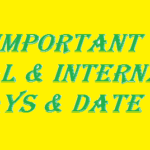Many employers now use behavioral-based interview questions to learn more about a candidate’s past experience as a predictor for future performance, but there are still some companies and some interviewers who will use tough interview questions as a method of determining whether or not a candidate is a good fit for the open position.
While you can’t predict every question you will be asked during the interview process, it’s a good idea to familiarize yourself with some of the more common tough interview questions.
1. What’s Your Biggest Weakness?-
· There’s really no easy answer to this tough interview question, but it helps to be honest with the interviewer.
· No one is perfect and if we’re truthful, there are certain things that we can all improve. Try not to provide too much damaging information like an inability to arrive at work on time or at all.
· This is definitely a loaded question, so tread lightly, but perhaps mention an area that you are working to improve.
2. How Do You Handle Stress?-
· Interviewers are generally looking for an answer that indicates you can handle multiple priorities and projects at the same time. An answer stating that stress is a natural part of life and you feel equipped to handle the challenges of the job and balance them with the rest of your life may be just the answer that earns you the job.
3. Tell Me About A Time You Made A Bad/Wrong Decision-
· The interviewer is probably not as concerned with the actual decision, but rather how you handled the situation and the outcome.
· This question is asking for your problem-solving ability and ability to fix an issue.
4. Questions About Honesty, Loyalty, And Good Judgment-
· Employers want to hire ethical people with integrity, so don’t feel like you’ve been thrown a curve ball if an interviewer asks you a tough interview question about whether or not you’ve ever lied or been faced with a moral dilemma.
· As is the case in most situations, honesty is the best policy in answering these questions.
5. Tell Me About Yourself-
· This seemingly easy interview question is harder than it may seem for many candidates. It’s easy to ace this one if you have a prepared and practiced “elevator speech” that includes a few highlights from your career history.
· This is an opportunity to emphasize your best career accomplishments, so take advantage of this question if you are asked during the interview.
6. Questions About Former Bosses And Co-Workers-
· Sometimes an interviewer will ask a question about what you didn’t like about a former supervisor or colleague. These questions are asked to gauge how well you work with others, so be diplomatic in your answer and don’t throw anyone under the bus with negativity.
· Another great way to prepare for tough interview questions is to ask your friends about the most bizarre and off-the-wall questions they have been asked. You may be surprised at the type of responses you receive!
Four Tips To Answer Tough Interview Questions Correctly:-
· From blatant interview questions like, “What’s your greatest weakness, weakest attribute, or most significant failure.” To soft, “What might your previous employer say?” Even softer, “You certainly seem to have a lot of strengths, but we understand no one is perfect.”
· The question will come one way or another, everyone knows it, yet still befuddled by it.
· There have been many Rules of Thumb (R.O.T.) developed over the years, from making light of the question with an answer like “Pizza!” to true confessions, putting a cloud over everyone, to developing a response that actually demonstrates a strength, “I tend to be a workaholic,” or “perfectionist.” (Yuk!)
· In principle, Rules of Thumb are meant to have very broad application such as, “when in doubt, get out.” Great advice if you are in the middle of an intersection and the light changes. Would it apply in the final seconds of a game, you’re down three points and have the ball? What, you’re going to walk off the floor? I don’t think so. I find many R.O.T. (pun intended) to be off the mark and misleading. What may be good for one may not be for another. That is not to say there are no rules that can be applied; there are. Just choose your medicine carefully.
· When you have to answer tough interview questions, here’s the first rule…
Interview Rule 1 – Stay Positive… ALWAYS! :-
The “what’s your greatest weakness” question is your opportunity to shine. One way is to demonstrate you are a positive person by nature. Everyone likes a person with a positive nature, right? Remember you are in the interview to make yourself desirable for hiring, so you might say, “I rarely sit there and think of myself in those terms, nevertheless, I do want to respond to your question,” or something on those lines.
Notice by the way I did not say, “I rarely sit there and think of my weaknesses.” Here’s a rule of thumb that always applies: Do not use or repeat negative terms, even if the interviewer throws it out there.
Here are three other rules I suggest you follow for efficient interview preparation:
Interview Rule 2 – No Superlatives! :-
Keep it singular. Superlatives such as “weakest” or “worst” or “biggest” indicate the greatest degree of whatever is it describing. “Worst weakness” is the weakness of the highest degree implying there are other weaknesses of varying degrees but weaknesses nonetheless. That begs the question, “What are some others?” Likewise, “need most to improve” implies there are others areas for improvement. In any case, try this as an alternative, “If I had to come up with one…” (No negatives, no multiples.)
Interview Rule 3 – No Absolutes! :-
The absolute, as in “My weakness is…” states the weakness exists unconditionally: utterly fixed and not likely to change. WOW! Wouldn’t it be better to be a little less restrictive, something more conditional like, “It could be I am…” Conditional responses suggest you yourself are not completely convinced of it. This type of response also accomplishes what the bungling technique of using a “strength” to describe a weakness consistently fails to achieve – your “weakness” may not be a weakness after all.
Interview Rule 4 – Keep It Real! :-
Your “weakness” should be one (singular) that is subjective – of your person. Humanize it!
“If I had to come up with one (singular) it might be (non-absolute) somewhat (qualifier) of a lack of internal patience (human). I seem (unconvinced) to have strong tendencies to expect the same from others I do from myself (human).
Not just in terms of results – I’m smart enough to realize not everyone has the same level of skill, abilities and education (real). I do however, expect others to give their best effort, and if that’s not there, then yes, that might (conditional) bother me to some degree.”
Ah! “Bother me to some degree,” is human, non-absolute, qualifier, and conditional. Don’t you love it?! Another tact, similarly keeping it real, could be an incident resultant of some area where improvement was needed (potential weakness) that turned out to be a learning experience and later grew into a personal asset, thus giving you, once more, an opportunity to showcase strength.
















